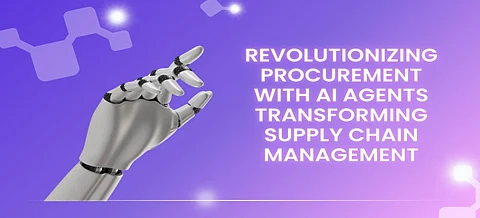

The procurement landscape is an ever-evolving with AI integration at its crux. AI-driven procurement technologies specialist Parameswara Rao Tatini elaborates on how AI agents are upending traditional procurement systems. Such disruptions, by enhancing automation and decision-making capabilities, can bring greater efficiency, scalability, and agility to modern supply chains.
Manual processes have been relied upon in traditional procurement methods for too long. Many lapses and errors accompanied most manual procurement activities, from supplier discovery to contracts management. Because of fragmented data, people have had trouble optimizing their procurement practices, as well as real-time insights. Fortunately, with AI, procurement has changed from being reactive to being proactive. Processing massive quantities of data in real-time allows procurement operations to realize cost savings while increasing efficiency for streamlining operations. Purchase teams have become capable of faster and much more precise decisions through innovations.
Supplier discovery and evaluation is one of the most effective applications of AI in procurement. Traditionally selecting suppliers and assessing them was a manual process, with very limited data and subjective judgments. AI can measure hundreds of factors in real time, even from conditions of financial stability, production capacity, supplier reliability, compliance, etc. It empowers procurement teams to have better supplier matching. With AI, procurement systems enable companies to update supplier performance in real-time, establishing a much larger picture of supplier reliability and risk. The systems can now autonomously track metrics about financial health, delivery times, and quality metrics, ensuring procurement teams access the correct actionable data.
Although demand forecasting has always been a linchpin of procurement, traditional methods have relied on simple models and historical data. Such reliance has always cast doubts on the accurate predicting of future needs. With AI-driven predictive analytics, however, forecasting accuracy has been transformed to a level where one looks beyond historical data and market trends to external factors and seasonality. Thus predictive modeling is more accurate than rudimentary methodologies, allowing the procurement wing to optimize inventory decisions, eliminate stock shortfalls, and reduce wastage. As a result, predictive analytics have facilitated an increase in forecasting reliability from 70 percent to greater than 92 percent, resulting in better resource planning and, thus, more astute purchasing decisions.
In contract management, one of the areas being revolutionized by AI is procurement. Traditionally, contracts have been tedious and manual processes, often resulting in delays that were costly and errors that were costly. AI-powered contract management systems streamline the process through automating document generation, analyzing contract terms, and recognizing risks. Risk management is even more enhanced with AI. Procurement teams can monitor suppliers and international supply chains in real time, using AI to discover any risks posed by natural disasters and market fluctuations. This allows AI systems to predict impending disruptions so businesses can take preventive action and enhance the resilience of their supply chains.
In the future, there will be further integration of AI and new technologies, such as blockchain, and collaborative ecosystems, thus increasing its role in procurement. Blockchain gives procurement a high degree of transparency, security, and traceability of all transactions. Besides this, the integration of blockchain with AI will provide significant enhancements to supply chain traceability and compliance. With the combined efforts of these technologies, organizations will be enabled to automate the validation of transactions, ensuring that the actions undertaken are accurate and consistent across all chains of supply.
In conclusion, Parameswara Rao Tatini's study dovetails remarkably well with the transformative effect AI-powered agents have on procurement systems. Supplier discovery automation, enhanced demand forecasting, and improved contract management have completely changed how organizations govern their supply chain. Improvements will reduce risks and make decisions much smarter and strategic. Moreover, with the evolution of AI into new technologies like blockchain, procurement will soon become completely automated, transparent, and resilient.
